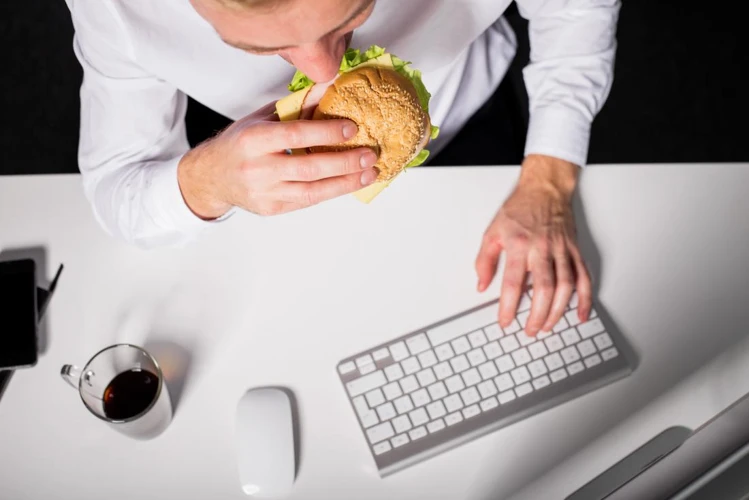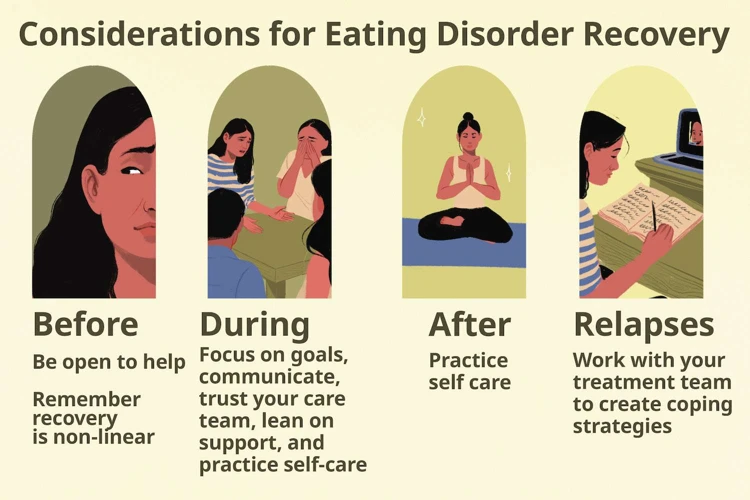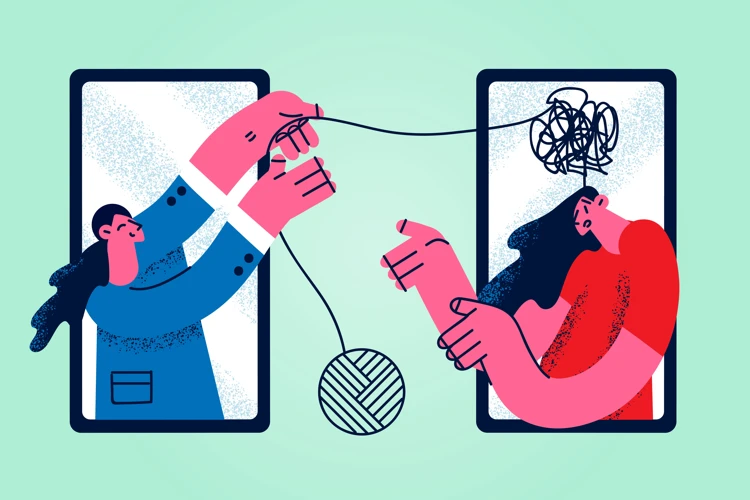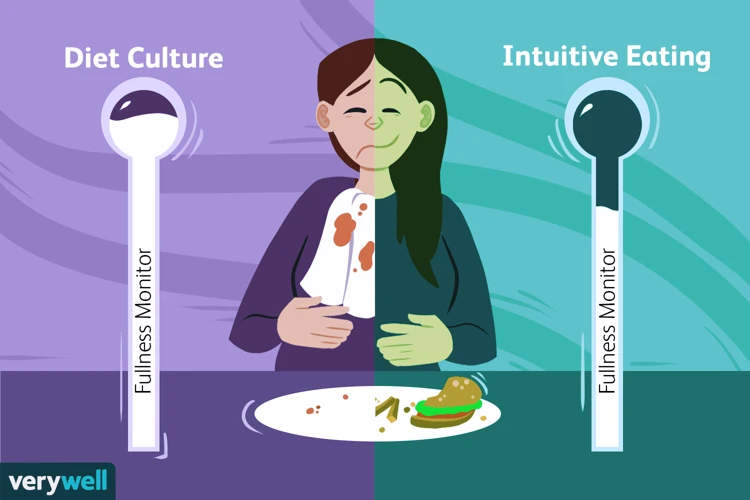Many of us turn to food for comfort in moments of stress or sadness, but when this becomes a pattern, it can lead to emotional eating. Emotional eating is a complex issue with a variety of underlying causes, including trauma, depression, and family dynamics. If you find yourself struggling with emotional eating, seeking the help of a professional can be a valuable step towards understanding and managing the issue. However, with so many options available, it can be overwhelming to know where to start. In this article, we will explore what to expect from a professional who helps people with emotional eating, the different types of professionals available, and how to choose the right fit for you.
What Causes Emotional Eating?

Our relationship with food can often be complex and multi-dimensional. While some people turn to food for sustenance and enjoyment, others use food as a way to cope with difficult emotions. This type of eating, known as emotional eating, can be triggered by a range of factors, including trauma, stress, depression, anxiety, and family and social factors. Understanding the root causes of emotional eating is an essential step towards developing a more positive relationship with food and improving overall well-being. Let’s explore some of the factors that contribute to emotional eating in more detail.
Trauma and Stress
Experiencing trauma or prolonged stress is one of the main causes of emotional eating. Trauma such as abuse, violence, or a significant life event can lead to feelings of helplessness and insecurity. Prolonged stress caused by work, finances, or relationships can also trigger emotional eating as a coping mechanism.
These experiences can lead to a range of emotions, including anxiety, depression, and loneliness, which can cause a person to turn to food for comfort. In some cases, the person may not even be aware that they are using food to cope with their emotions.
It is important to address the root causes of emotional eating, especially those caused by trauma and stress. This may require the help of a licensed therapist or counselor who specializes in trauma-informed care.
Some commonly used therapeutic techniques for trauma and stress include Cognitive Behavioral Therapy (CBT) and Eye Movement Desensitization and Reprocessing (EMDR). These methods can help individuals process and make sense of their trauma or stress, as well as develop coping mechanisms that do not involve food.
Table: Examples of Traumatic Events
| Physical abuse | Sexual abuse | Verbal abuse |
| Domestic violence | Natural disasters | Major accidents |
| Combat | Loss of a loved one | Emotional neglect |
By working with a mental health professional who specializes in emotional eating, individuals can learn to recognize and manage their feelings in healthy ways, leading to a more balanced and fulfilling life.
Depression and Anxiety
Depression and anxiety are two emotional states that can frequently lead individuals to emotional eating. Depression is characterized by persistent feelings of sadness, hopelessness, and low energy. It can also result in changes in sleep and eating patterns. In some cases, individuals who suffer from depression may turn to food as a means of coping or seeking comfort from negative emotions.
Anxiety is a state of unease or apprehension. It can manifest as physical symptoms such as trembling, sweating, and increased heart rate. Individuals who experience anxiety may find themselves turning to food as a way of calming their nerves or relieving stress.
Both depression and anxiety can contribute to the development of emotional eating behaviors. In some cases, individuals may feel overwhelmed by negative emotions and turn to food as a way of coping. In other cases, individuals may use food as a way of distracting themselves from their negative emotions.
It’s important to note that emotional eating is not a healthy coping mechanism and can lead to negative physical and emotional outcomes. Working with a professional can help individuals develop healthier coping mechanisms and address the underlying emotional issues contributing to their emotional eating behaviors.
| Emotional State | Characteristics | Impact on Eating Habits |
| Depression | Persistent feelings of sadness, hopelessness, and low energy. Changes in sleep and eating patterns. | Individuals may turn to food as a means of coping or seeking comfort from negative emotions. |
| Anxiety | Feelings of unease or apprehension. Physical symptoms such as trembling, sweating, and increased heart rate. | Individuals may turn to food as a means of calming their nerves or relieving stress. |
Family and Social Factors
Family and social factors can also contribute to emotional eating. These factors can include:
- Family dynamics: Growing up in a household where food was used as a reward or punishment can create an unhealthy relationship with food. Additionally, family members who also struggle with emotional eating can normalize these behaviors.
- Cultural influences: Certain cultures may value food as a central part of social interactions, leading to overeating in social situations.
- Social situations: Being around friends or coworkers who frequently indulge in unhealthy foods or participate in emotional eating can also influence one’s own behavior.
- Peer pressure: Pressure from friends or family to fit into a certain body type or conform to diet trends can also lead to emotional eating and disordered eating behaviors.
It’s important to remember that these family and social factors are not necessarily the sole cause of emotional eating, but they can certainly contribute to and exacerbate the issue. A professional can help identify the root causes and work towards solutions for managing emotional eating behaviors.
What is Emotional Eating?

Emotional eating is a type of behavior where a person eats in response to their emotions rather than physiological hunger. It involves using food as a means of coping with emotional distress or regulating one’s mood. This often leads to overeating and can have negative consequences on one’s physical and emotional well-being.
Individuals who engage in emotional eating often consume foods that are high in fat and sugar, as these types of foods activate the brain’s reward system and provide a temporary feeling of pleasure and comfort. However, these feelings of satisfaction are short-lived and may be followed by feelings of guilt, shame, or remorse.
Emotional eating can be triggered by a variety of emotions, including stress, anxiety, loneliness, sadness, boredom, and even happiness. In some cases, emotional eating can become a habitual behavior that is used to cope with all types of emotions, rather than just negative ones.
While occasional emotional eating may not be a cause for concern, frequent episodes of emotional eating can lead to weight gain, obesity, and a range of health problems. It is important to identify the underlying causes of emotional eating and seek professional help to overcome this behavior.
How Can a Professional Help?

When it comes to emotional eating, seeking the help of a professional can be a game changer. Professional assistance can offer you valuable insights and tools to help you break free from unhealthy patterns of behavior, achieve a healthier relationship with food, and ultimately improve your overall well-being. Here’s a closer look at the ways in which a professional can help you overcome emotional eating.
Identify Triggers
When seeking professional help for emotional eating, one of the first steps is to identify triggers that lead to overeating. These triggers can be different for each individual and may include various emotions, situations, or even physical sensations. Through discussions with a professional, you can become more aware of these triggers and learn to recognize them in order to develop coping mechanisms.
Here are some common triggers to be aware of:
- Stressful events – When we experience stress in our lives, it can lead to emotional eating as a way to cope. This can include events such as work deadlines, relationship issues, or family problems.
- Unresolved trauma – Traumatic experiences from our past can lead to emotional eating as a way to cope with the associated emotions. This can include physical, emotional, or sexual abuse, as well as other traumatic events.
- Negative emotions – Certain emotions such as sadness, anxiety, or anger can lead to emotional eating as a way to numb or distract from these feelings.
- Food cravings – Certain foods or smells can trigger overeating, such as the smell of freshly baked cookies or the sight of a bag of chips.
- Environmental cues – Our surrounding environment can also trigger overeating, such as being in a social setting where others are eating or watching TV commercials for food products.
By identifying these triggers, a professional can help you become more aware of the situations or emotions that lead to overeating. From there, you can begin to develop a plan to address these triggers and find healthier ways of coping. This may involve learning relaxation techniques, practicing mindfulness, or finding alternative activities to engage in instead of turning to food.
Create a Plan
Creating a plan is a vital step in helping individuals with emotional eating. This plan should be tailored to the needs and goals of the individual. Here are some components that may be included in the plan:
| Component | Description |
|---|---|
| Setting goals | Setting achievable and specific goals to work towards can provide direction and motivation. |
| Developing healthy habits | Practicing habits such as mindful eating, stress-reducing activities, and regular exercise can have a positive impact on emotional eating behavior. |
| Identifying triggers | Continuing to identify and address triggers for emotional eating can help prevent future instances of overeating due to emotions. |
| Meal planning | Creating a meal plan and setting aside time for meal preparation can help reduce spontaneous and impulsive eating. |
| Tracking progress | Recording progress and setbacks can help individuals stay accountable and adjust their plan accordingly. |
Working with a professional can also provide guidance and additional strategies for creating a personalized plan that addresses individual needs and challenges.
Support and Accountability
One important way that a professional can help individuals struggling with emotional eating is by providing support and accountability. This is especially important because changing ingrained behaviors and emotional responses is difficult to accomplish alone. A professional can provide the support and guidance needed to make lasting positive changes.
During counseling sessions, the professional will provide a safe and judgment-free space for individuals to discuss their challenges and progress. They will listen actively and provide constructive feedback, empathy and perspective. The professional will offer encouragement and reassurance while working through difficult emotions and setbacks.
The professional will help to hold individuals accountable for their goals and action steps through regular check-ins and monitoring progress. This can be done through various methods, including journaling, tracking food intake, setting and reviewing goals, and evaluating progress.
Ultimately, the support and accountability offered by a professional can help individuals overcome emotional eating and develop healthier habits that last a lifetime.
| Ways a Professional Can Provide Support and Accountability |
|---|
| Active listening and constructive feedback |
| Empathy and perspective |
| Encouragement and reassurance |
| Regular check-ins and progress monitoring |
| Goal setting and evaluation |
| Journaling and food tracking |
What to Expect in a Professional Counseling Session

The prospect of attending a professional counseling session to address emotional eating can be overwhelming and anxiety-inducing. However, it is important to understand what you can expect from these sessions to ease any apprehension. By attending counseling sessions, you will have the opportunity to delve into the root causes of your emotional eating and develop strategies to overcome it. In the following section, we will discuss the various components of a professional counseling session for emotional eating and how they can benefit you in your journey towards a healthier relationship with food.
Discussion of Your Relationship with Food
During a professional counseling session, one of the first areas of focus when dealing with emotional eating is discussing the individual’s relationship with food. This includes examining their eating habits, preferences, and cravings. The goal of this discussion is to gain insight into why and how emotional eating occurs, as well as to identify specific triggers.
A registered dietitian or licensed therapist may ask questions about your past experiences with food and eating, as well as any current struggles or challenges you are facing. They may ask about the types of food you turn to when feeling stressed or overwhelmed, and how frequently you engage in emotional eating behaviors. This conversation provides a foundation for identifying patterns and underlying issues related to food and emotions.
It is important to be open and honest during this discussion, even if it feels uncomfortable or embarrassing. The more information the professional has, the better they can develop an individualized plan to address emotional eating. For example, if certain foods or situations trigger emotional eating, the professional can work with the individual to develop healthy alternatives and coping strategies.
The discussion of your relationship with food is a crucial aspect of addressing emotional eating. It sets the groundwork for a more comprehensive approach to managing emotional eating behaviors and achieving overall well-being.
Exploration of Emotional and Behavioral Patterns
During a professional counseling session for emotional eating, one can expect an exploration of their emotional and behavioral patterns. The **exploration** is intended to help identify the root causes of emotional eating and to develop strategies to overcome it. This process requires the client’s active participation and willingness to be vulnerable with their counselor.
Emotional patterns refer to how the client reacts or responds emotionally to certain situations or triggers. The counselor may ask probing questions to determine if there are any common themes in the client’s emotional responses to certain events. For instance, if the client tends to turn to food whenever they experience stress at work, the counselor may explore what is causing the stress to manifest in this way.
Behavioral patterns, on the other hand, refer to how the client behaves in response to emotional triggers. The counselor may ask questions about the client’s eating habits, such as whether they tend to binge eat, eat in secret, or eat in response to specific emotions. The counselor may also explore other behaviors that may be associated with emotional eating, such as avoiding social situations or using food as a coping mechanism.
This exploration of the client’s emotional and behavioral patterns will help the counselor gain insight into what drives the client’s emotional eating habits. With this knowledge, the counselor can then help the client develop effective strategies to manage their emotions and cravings without turning to food.
Creation of an Action Plan
During a professional counseling session for emotional eating, the creation of an action plan is one of the most important steps towards achieving success. This stage involves working with a professional to map out a plan of action that addresses your specific goals and concerns. The action plan will include strategies and techniques to help you manage your emotional eating behaviors and develop healthier habits.
Here is an example of what an action plan might look like:
| Action Steps | Timeline | Resources Needed | Outcome Measures |
|---|---|---|---|
| Keep a food diary to track emotional eating patterns | First week of counseling | Journal/notebook | Reduction in the number of emotional eating incidents |
| Incorporate mindfulness practices into daily routine | Next 4 weeks | Meditation app/Online resources | Increased awareness and ability to manage emotional states |
| Challenge negative self-talk related to food and body image | Ongoing | Positive affirmations/Support group | Improved self-esteem and body positivity |
| Develop a structured meal plan with a registered dietitian | Within the first 2 sessions | Referral to a dietitian | Improved knowledge of healthy eating habits and reduction in binge eating episodes |
With a structured action plan, you can take actionable steps towards achieving your goals and overcoming emotional eating habits that have been holding you back. The plan should be realistic and achievable, and involve ongoing progress monitoring and adjustments as needed. A professional can guide and support you throughout this process, helping you to stay motivated and on track towards success.
Types of Professionals Who Help with Emotional Eating

When seeking help for emotional eating, there are various professionals that can offer support and guidance. These individuals are specifically trained to help individuals identify their triggers and develop effective coping mechanisms to better manage emotional eating. It’s important to understand the different types of professionals available and what each can offer to determine which one is the right fit for you. Here are some key factors to consider when selecting a professional to work with.
Registered Dietitian
One type of professional who can help with emotional eating is a Registered Dietitian. These professionals specialize in nutrition counseling and can provide guidance on developing healthy eating habits. They can also help identify triggers and create a plan for managing emotional eating.
Registered Dietitians (RDs) typically have a bachelor’s degree in nutrition and have completed an internship program. They must also pass a national exam and maintain continuing education requirements to maintain their certification.
RDs use a personalized approach to help their clients achieve their nutrition and health goals. During counseling sessions, they can provide education on nutrient-rich foods, portion sizes, and healthy cooking methods. They can also help clients learn how to read food labels and make informed choices when eating out.
Additionally, RDs can work with clients to develop a balanced meal plan that meets their individual needs and preferences. They can also provide guidance on planning meals and snacks to help manage hunger and prevent unhealthy eating behaviors.
When seeking a registered dietitian for support with emotional eating, it’s important to choose someone who has experience working with this issue. Additionally, finding a practitioner who you feel comfortable working with can help you build a strong trust-based relationship that can aid in your journey towards healing.
Licensed Therapist or Counselor
Licensed therapists or counselors are mental health professionals trained to provide therapeutic support and guidance to individuals struggling with emotional eating. They can help you address the underlying emotional issues that fuel your unhealthy relationship with food, and support you in developing more positive coping mechanisms.
One of the main benefits of working with a licensed therapist or counselor is that they provide a safe, non-judgmental space where you can work through difficult emotions and unresolved traumas that may be impacting your eating habits. They use evidence-based psychotherapy techniques to help you cultivate more self-awareness, insight, and resilience.
During your sessions with a therapist or counselor, you can expect to explore the connection between your emotions and eating behaviors. You may discuss past experiences that may have contributed to your emotional eating, and work to identify any negative thought patterns or beliefs that are holding you back. Your therapist may also help you develop mindfulness skills, which can help you become more present and attuned to your emotions and physical sensations.
Similar to other professionals who help people with emotional eating, licensed therapists or counselors tailor their approach to your specific needs and goals. They may use cognitive-behavioral therapy (CBT), dialectical behavior therapy (DBT), or other types of psychotherapy to help you develop healthier coping strategies.
It’s important to note that while licensed therapists and counselors can provide therapeutic support for emotional eating, they may not provide specific nutrition advice. If you’re seeking help with making changes to your diet, it may be beneficial to work with a registered dietitian in conjunction with a therapist.
Here’s a summary of what you can expect from working with a licensed therapist or counselor for emotional eating:
| What to Expect from a Licensed Therapist or Counselor: |
|---|
| Safe, non-judgmental space for therapy |
| Exploration of emotions and eating behaviors |
| Identification of negative thought patterns or beliefs |
| Mindfulness skill development |
| Use of evidence-based psychotherapy techniques |
| Tailored approach to individual needs and goals |
Health Coach
A health coach is a professional who focuses on the overall well-being of their clients, rather than just their food intake. These coaches work with clients to create a personalized plan that targets their individual needs in terms of nutrition, exercise, and stress management.
One of the main benefits of working with a health coach is their ability to provide ongoing support and encouragement, which can be vital for individuals struggling with emotional eating. They also work to identify patterns and triggers that may be contributing to the client’s emotional eating habits, and help devise strategies for combating these triggers.
Here is a comparison table outlining some common differences between a registered dietitian and a health coach:
| Registered Dietitian | Health Coach |
|---|---|
| Focuses primarily on nutrition and food intake | Focuses on overall well-being, including nutrition, exercise, and stress management |
| May provide meal plans and nutritional guidelines | May provide exercise routines and stress management techniques |
| May have a clinical background and be able to diagnose and treat medical conditions related to diet | May have specialized training in areas such as mindfulness and meditation |
If you are considering working with a health coach, it is important to find one with experience specifically in the area of emotional eating. Look for someone who has a holistic approach to wellness and a strong understanding of the connections between nutrition, exercise, and emotional health.
Psychologist or Psychiatrist
When it comes to seeking help for emotional eating, a psychologist or psychiatrist can be a great option. These professionals have extensive training in understanding and treating mental health disorders, including those related to eating behaviors.
A psychologist is a mental health professional who holds a doctoral degree in psychology. They are trained in a variety of therapeutic techniques, such as cognitive-behavioral therapy, which can be helpful in treating emotional eating. Psychologists work with clients to identify the underlying emotional and psychological factors that contribute to unhealthy eating habits, and help develop strategies to address these issues.
On the other hand, a psychiatrist is a medical doctor who specializes in mental health. They are able to diagnose and treat mental health disorders, and can prescribe medications if needed. In the case of emotional eating, a psychiatrist may use medication to address underlying mental health conditions such as depression, anxiety or bipolar disorder, which may be contributing to the unhealthy eating patterns.
Both psychologists and psychiatrists can work with individuals to identify underlying issues like trauma or negative thought patterns that may be contributing to emotional eating. They can provide individualized treatment plans, support and guidance to help individuals develop healthy coping mechanisms and positive relationships with food.
It’s important to note that seeking help from either a psychologist or psychiatrist should be done in conjunction with other healthy lifestyle changes, such as improved eating habits and regular exercise. A balanced approach to treatment will provide the most comprehensive support for those struggling with emotional eating.
Here’s a comparison chart of Psychologist and Psychiatrist:
| Psychologist | Psychiatrist | |
|---|---|---|
| Education | Holds a doctoral degree in psychology. | Is a medical doctor who specializes in mental health. |
| Treatment | Uses therapeutic techniques to address underlying psychological factors contributing to emotional eating. | Can diagnose and treat mental health disorders, and prescribe medication if necessary. |
| Approach | Focuses on talk therapy and behavior modification techniques. | May use medication and other medical treatments in addition to therapy. |
| Insurance Coverage | Therapeutic services may or may not be covered by insurance plans. | Medical services are typically covered by insurance plans. |
How to Choose the Right Professional for You
Asking for help with emotional eating can be a difficult step, but finding the right professional to work with can be equally challenging. With a variety of professionals available, it can be intimidating to determine who will best meet your needs. However, with some guidance and research, you can select a professional who is qualified and experienced enough to help you on your journey towards healing and healthy habits. Consider these steps to help you choose the right professional for you.
Determine Your Needs
Determining your needs is an important step in finding the right professional to help with emotional eating. Here are some steps to follow when determining your needs:
- Reflect on your current situation: Consider how emotional eating is affecting your life. Are there certain triggers that lead to your emotional eating? What impact is this having on your health, relationships, and overall wellbeing? Understanding your current situation can help you communicate your needs to a professional.
- Consider your goals: Think about what you want to achieve through working with a professional. Do you want to stop emotional eating altogether, or are you simply looking for better ways to manage it? Are there specific health or wellness goals you want to achieve?
- Think about your personality and communication style: Different professionals have different styles and approaches, so it’s important to consider what works best for you. Do you prefer a more direct communication style, or do you respond better to a gentle approach? Are you more comfortable speaking one-on-one, or do you prefer group settings?
- Reflect on any past experiences: Consider any experiences you may have had with professionals in the past. What worked well for you, and what didn’t? Were there certain qualities that you appreciated in a professional?
- Consider your budget: Depending on your financial situation, you may have more or less flexibility when it comes to choosing a professional. Consider what you’re willing and able to invest in your health and wellbeing.
Taking the time to reflect on these factors can help you determine what you need from a professional who can help with emotional eating. This, in turn, can help guide you towards finding the right professional for you.
Ask for Referrals and Recommendations
When looking for a professional to help with emotional eating, it can be helpful to ask for referrals and recommendations from others who have been in a similar situation. This can help you find a trusted and experienced professional who can offer effective support and guidance.
Where to Ask for Referrals and Recommendations: It’s important to reach out to credible sources for referrals and recommendations, as not all advice may be reliable or accurate. Here are some places to consider:
| Source | Description |
|---|---|
| Primary Care Physician | Your doctor may be able to refer you to a trusted professional specializing in emotional eating. |
| Support Groups | Attend support groups or online communities focused on emotional eating to connect with others who have similar experiences and ask for recommendations. |
| Friends and Family | Reach out to trusted contacts who may have sought help for emotional eating and ask for their recommendations. |
| Professional Organizations | Look up professional organizations relevant to emotional eating such as the International Association of Eating Disorder Professionals, which may provide directories of professionals in your area. |
Questions to Ask When Evaluating Referrals and Recommendations: It’s important to evaluate referrals and recommendations carefully to ensure they align with your needs and goals. Here are some questions to consider when evaluating potential professionals:
| Question | Description |
|---|---|
| What are their qualifications? | Look up their credentials and licenses to ensure they are qualified to offer services for emotional eating. |
| What is their experience? | Consider how many years of experience they have in the field and if they have experience working with clients with similar needs or backgrounds. |
| What is their approach and philosophy? | Look for a professional whose approach and philosophy align with your beliefs and values. |
| Can they provide references? | Ask for references from other clients whom they have helped with emotional eating, and reach out to them for feedback. |
By asking for referrals and recommendations and evaluating potential professionals based on your needs and goals, you can find a trusted and experienced professional who can offer personalized support and guidance for overcoming emotional eating.
Check Qualifications and Experience
When searching for a professional to help with emotional eating, it is crucial to ensure that they have the qualifications and experience necessary to provide effective treatment. Here are some factors to consider:
| Factor | What to Look For |
|---|---|
| Educational Background | Look for professionals who have degrees and certifications in relevant fields such as psychology, nutrition, or counseling. It is important to note that different professionals may have different levels of education and training. |
| Licensing and Certification | Check that the professional you are considering is licensed or certified by the appropriate governing body in their field. This ensures that they have met certain standards and are qualified to provide treatment. |
| Experience | Find out how long the professional has been practicing and how much experience they have treating people with emotional eating. Ask about their success rates and any specializations they may have. |
| Approach to Treatment | Ask about the professional’s approach to treating emotional eating. Do they take an individualized approach or use a standardized program? Is their approach evidence-based? |
Taking the time to check a professional’s qualifications and experience can help ensure that you receive the most effective treatment possible for your emotional eating. It is important to find a professional who is not only qualified but also a good fit for your individual needs and preferences.
Conclusion
After reading this article, it is clear that emotional eating can have a profound impact on a person’s physical and emotional well-being. Identifying the underlying causes of emotional eating is crucial in order to make progress towards healthier eating habits. With the help of a qualified professional, individuals struggling with emotional eating can develop a deeper understanding of their triggers and patterns, and create a plan for managing their emotions without turning to food.
Whether you choose to work with a registered dietitian, licensed therapist or counselor, health coach, or psychologist or psychiatrist, it is important to select a professional who is qualified and experienced in treating emotional eating. Asking for referrals and recommendations from trusted sources, and checking the professional’s credentials and experience, can help you make an informed decision about who to work with.
The road to recovery from emotional eating may not be easy, but with the right support and guidance, it is possible to cultivate a healthy relationship with food and with oneself. By seeking out the help of a qualified professional, individuals can gain the tools and resources needed to make lasting changes in their lives. Remember, healing is possible, and taking the first step towards getting help is a powerful act of self-care.
Frequently Asked Questions
What are some common triggers for emotional eating?
Some common triggers include stress, anxiety, depression, boredom, and social situations.
Can emotional eating lead to weight gain?
Yes, emotional eating often leads to consuming more calories than the body needs, which can lead to weight gain over time.
Is emotional eating the same as binge eating disorder?
No, emotional eating refers to eating in response to emotions, while binge eating disorder is a diagnosable mental health condition characterized by recurrent episodes of excessive eating, with a sense of loss of control.
Can emotional eating be treated?
Yes, emotional eating can be treated with the help of a professional who can assist in identifying triggers, creating a plan, and providing support and accountability.
What is the first step to addressing emotional eating?
The first step is to identify the triggers that cause emotional eating episodes, whether they are stress, boredom, or other emotions.
What are some strategies for avoiding emotional eating?
Some strategies include finding alternative coping mechanisms, such as exercise or meditation, practicing mindful eating, and avoiding environments or situations that trigger emotional eating.
Can emotional eating be a sign of a mental health disorder?
Yes, emotional eating can be a symptom of mental health disorders such as depression, anxiety, and post-traumatic stress disorder.
How long does it take to see improvement when seeking professional help for emotional eating?
The length of time it takes to see improvement varies based on individual circumstances, but with consistent effort and support from a professional, improvement can be seen within a few weeks to a few months.
What qualifications should I look for in a professional who helps with emotional eating?
Look for a professional with qualifications and experience in mental health, nutrition, or coaching, such as a licensed therapist, registered dietitian, or health coach.
Is it possible to overcome emotional eating?
Yes, with the help of a professional and the assistance of coping mechanisms, it is possible to overcome emotional eating and develop a healthier relationship with food.







